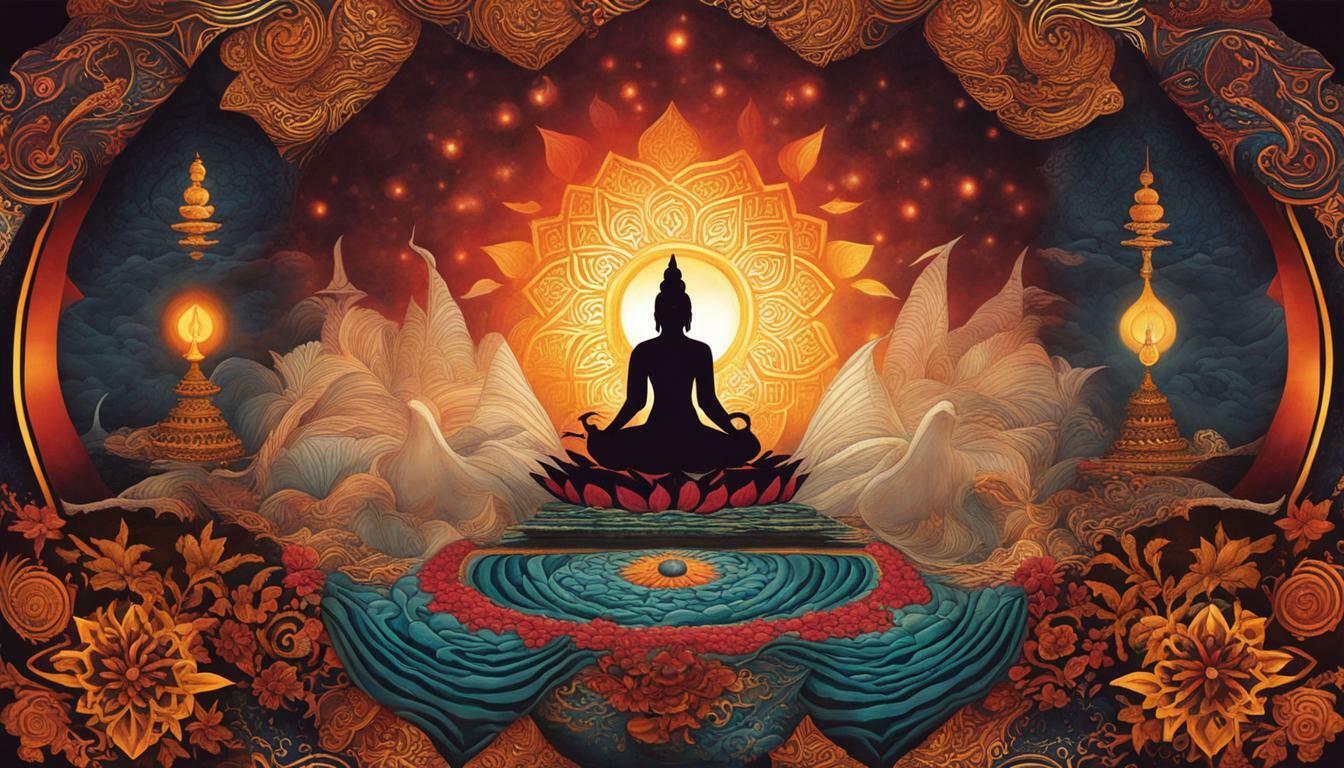When it comes to spiritual concepts, Nirvana and Moksha are two of the most profound and intriguing. While both refer to liberation and the attainment of spiritual transcendence, they are distinct concepts that belong to different spiritual traditions – Buddhism and Hinduism, respectively. In this article, we will explore the nuances and differences between these two concepts, as well as their significance in spirituality.
Key Takeaways:
- Nirvana and Moksha are two distinct concepts belonging to different spiritual traditions – Buddhism and Hinduism, respectively.
- Both aim for liberation and spiritual transcendence, but differ in their philosophical underpinnings and paths to attainment.
- Understanding the differences between Nirvana and Moksha can deepen our appreciation for the diverse spiritual traditions that exist in the world today.
What is Nirvana?
Nirvana is a central concept in Buddhism and refers to the ultimate goal of spiritual enlightenment and liberation from suffering. In Buddhism, suffering is seen as an inherent part of life, caused by our attachment to desire and the impermanence of all things. To achieve Nirvana, one must let go of attachment and attain a state of inner peace, wisdom and compassion.
This state of being goes beyond the material world and is often described as a state of pure consciousness or non-self. Achieving Nirvana is said to bring an end to the cycle of birth, death, and rebirth, leading to the ultimate release from suffering.
Key distinctions between Nirvana and Moksha lie in their underlying philosophical and spiritual beliefs. While both aim for enlightenment and liberation, Nirvana focuses on the individual’s liberation from suffering, whereas Moksha emphasizes the unity of individual consciousness with the divine.
What is Moksha?
Moksha is a concept in Hinduism that refers to the ultimate liberation of the soul from the cycle of birth, death, and rebirth (samsara). It is considered the highest goal of human existence and a state of spiritual transcendence that brings eternal peace, happiness, and freedom. According to Hindu philosophy, every living being is trapped in samsara because of karma, which is the accumulation of the actions and intentions of previous lives. The only way to break free from this cycle is to attain moksha, which allows the soul to merge with the divine consciousness.
Unlike Nirvana in Buddhism, moksha is not a state of nothingness but a state of being in which the individual soul merges with the universal soul (Brahman). In Hinduism, this ultimate realization is known as Advaita, which means non-dualism and implies that there is no distinction between the individual self and the divine self. This concept is different from Buddhism’s anatta (no-self) doctrine, which asserts that there is no permanent self or soul.
Key distinctions of Nirvana and Moksha
One of the main differences between Nirvana and Moksha is their philosophical underpinnings. While Buddhism emphasizes the notion of anatta and the impermanence of phenomena, Hinduism believes in the existence of Atman (the individual soul) and the eternal nature of the universe. Another key difference is the path to attainment. In Buddhism, Nirvana can be achieved through meditation, self-awareness, and the Eightfold Path, whereas in Hinduism, moksha can be attained through various means such as karma yoga, bhakti yoga, and jnana yoga.
Despite these differences, Nirvana and Moksha share many similarities. Both concepts seek to transcend the mundane world and attain a state of spiritual liberation and transcendence. They also emphasize the importance of self-awareness, morality, and mindfulness in achieving their ultimate goals.
Similarities and Differences Between Nirvana and Moksha
Both Nirvana and Moksha have significant similarities and differences. In terms of their ultimate goals, both concepts aim for liberation and transcendence. They share the common goal of breaking free from the cycle of birth and death to achieve eternal bliss.
However, the paths to attainment and the philosophical underpinnings of Nirvana and Moksha differ significantly. In Buddhism, Nirvana is a state of emptiness or nothingness that is achieved by relinquishing all desires and attachments. On the other hand, Moksha in Hinduism is a state of union with the divine, where the soul merges with the ultimate reality or Brahman.
Another significant difference between the two is the role of the self. In Buddhism, the concept of self or soul does not exist, and the ultimate goal is to transcend the notion of self altogether. In contrast, Hinduism considers the soul or Atman as the core of an individual’s being, and the goal is to merge the individual self with the universal self.
Despite these differences, both Nirvana and Moksha emphasize the importance of gaining spiritual knowledge, developing moral virtues, and practicing meditation or self-reflection. Both concepts require a deep understanding of the nature of reality, the impermanence of existence, and the illusory nature of worldly pleasures.
Comparative Study of Nirvana and Moksha
A comparative study of Nirvana and Moksha can help us appreciate the diversity and richness of spiritual traditions. While both concepts share the common goal of liberation, they offer different paths to achieve it. Buddhism emphasizes the importance of detachment and letting go of all desires, while Hinduism emphasizes the need to transcend the ego and merge with the divine.
Furthermore, the differences between Nirvana and Moksha highlight the unique perspectives and insights offered by different spiritual traditions. They show us that there are many paths to enlightenment and liberation, and each path offers its own distinct insights into the nature of existence.
Overall, the similarities and differences between Nirvana and Moksha highlight the importance of understanding and respecting the diverse spiritual traditions that exist in the world today. By gaining an appreciation for the nuances of different concepts and practices, we can deepen our own spiritual understanding and find our own path to enlightenment and liberation.
The Significance of Nirvana and Moksha in Spirituality
Understanding Nirvana and Moksha is a crucial aspect of the spiritual paths of Buddhism and Hinduism respectively. While they differ in their philosophical underpinnings and paths to attainment, both aim for liberation and spiritual transcendence.
By delving into the nuances of Nirvana and Moksha, we can deepen our appreciation for the diverse spiritual traditions that exist in the world today. A comparative study of these concepts can help us identify the similarities and differences between them and how they impact spiritual seekers.
For those seeking spiritual enlightenment, understanding Nirvana and Moksha can provide insight into the ultimate goal of their spiritual journey. These concepts offer a path towards transcending the cycle of birth and death and achieving liberation from the worldly ties that bind them.
The significance of Nirvana and Moksha lies in their ability to guide spiritual seekers towards a deeper understanding of themselves and the universe around them. Through meditation, introspection, and self-reflection, one can attain a state of spiritual transcendence and achieve enlightenment.
Ultimately, understanding Nirvana and Moksha is about gaining a deep appreciation for the spiritual traditions and practices that have been passed down through generations. By exploring these concepts, we can gain a greater sense of the richness and diversity of human spirituality.
Conclusion
In conclusion, understanding the difference between Nirvana and Moksha is crucial in comprehending the diverse spiritual traditions that exist in the world today. While both concepts aim for liberation and spiritual transcendence, they differ in their philosophical underpinnings and paths to attainment.
By exploring the nuances of Nirvana and Moksha, we have gained insights into the significance of these concepts in Buddhism and Hinduism, respectively. While Nirvana emphasizes the importance of detachment and the cessation of suffering, Moksha highlights the attainment of the ultimate reality and the realization of the true self.
Through a comparative study of Nirvana and Moksha, we can appreciate the richness and diversity of spiritual paths that exist in the world today. These concepts hold immense value in the spiritual journeys of seekers and offer a profound path to enlightenment and liberation.
Final Thoughts
As we conclude our exploration of Nirvana and Moksha, it is essential to note that these concepts have shaped spiritual traditions for centuries and continue to influence the lives of millions around the world. By understanding the nuances of these profound concepts, we can gain a deeper appreciation for the diversity of spiritual paths in the world and enrich our own spiritual journeys.
FAQ
Q: What is the difference between Nirvana and Moksha?
A: Nirvana and Moksha are concepts of spiritual liberation in Buddhism and Hinduism, respectively. While both aim for ultimate liberation and transcendence, they differ in their philosophical foundations and paths to attainment.
Q: What is Nirvana?
A: Nirvana is a state of ultimate liberation and enlightenment in Buddhism. It represents the cessation of suffering and the attainment of perfect peace and enlightenment.
Q: What is Moksha?
A: Moksha is the concept of liberation and release from the cycle of birth, death, and rebirth in Hinduism. It signifies the realization of one’s true self and union with the divine.
Q: What are the key distinctions between Nirvana and Moksha?
A: While both Nirvana and Moksha aim for liberation, they differ in their philosophical perspectives and paths to attainment. Nirvana emphasizes the cessation of suffering and the realization of non-self, while Moksha focuses on the release from the cycle of rebirth and the union with the divine.
Q: What similarities and differences can be found between Nirvana and Moksha?
A: Both Nirvana and Moksha represent the ultimate goal of liberation and transcendence in their respective spiritual traditions. However, they differ in terms of their philosophical underpinnings, paths to attainment, and the role of the self in the process of liberation.
Q: What is the significance of Nirvana and Moksha in spirituality?
A: Nirvana and Moksha hold immense significance in the spiritual journeys of individuals. They provide a profound sense of purpose, guiding seekers towards enlightenment, liberation, and a deeper understanding of the self and the divine.
 Skip to main content
Skip to main content


